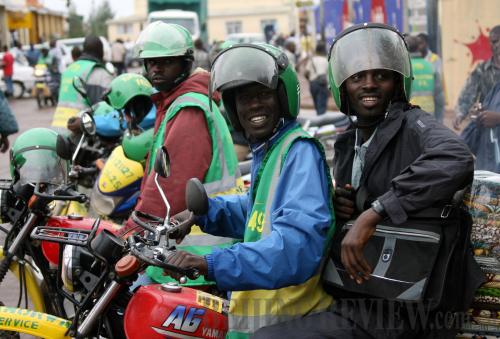|
 |
|
MODERN LIFESTYLE: Motorcycle taxis are very popular on the streets of Kigali, capital of Rwanda (WANG YING) |
Rwanda is serious about fixing its economy. In looking for inspiration into what can be done by a small state to produce big results, the country's leaders have found the Singapore Model of economic development to be just what the doctor ordered.
Now Rwanda needs to put in place the policies to make following this model of development possible.
"The challenge we face now in Rwanda is to take all the advice we have been given and implement it," said the country's High Commissioner to Singapore Paul Kayoboke.
However Emmanuel Kayitare, Director of Planning, Research and Statistics in Social Security Fund of Rwanda, said the reforms in social security systems, vital to economic progress, can only be implemented when laws introducing these reforms are enacted.
"Social security funds have acted as one of the most important variables in Singapore's economic development and a major source of long term finance in many countries where systems have been properly designed," he said.
The government, through the Rwanda Development Board (RDB), an institution that has been tasked with spearheading Rwanda's development, recently announced that progress is being made toward the implementation of Singaporean economic policies.
The institution brought together eight public agencies and more than 600 employees to form a dynamic institution with an ambitious agenda. The institution will be restructured along the lines of Singapore's Economic Development Board, which was the key agency for bringing about Singapore's development.
The government identified three institutions to replicate the successful and ambitious policies from Singapore. The institutions include the Workforce Development and Authority, National Social Security Fund and Rwanda Civil Aviation Authority.
According to Kayoboke, Singapore's rapid socio-economic transformation (known as The Singapore Model - see box) is an inspiration for Rwanda. Kayoboke said when Rwandan President Paul Kagame visited Singapore in 2008, he was quoted as saying that Singapore is one of the few cases whereby a poor country joined the ranks of rich nations in a single generation. Like Singapore, said Kagame, Rwanda is a small country without significant natural resources, whose potential and strength lie in its people and skills acquisition for powering its economic growth and development.
Workforce development
A skilled workforce is vital to sustain an effective economy. In this regard the government has embarked on a vocational and technical training program to bridge the skills gap in the country. To provide these alternative avenues of education for Rwandans, the Ministry of Education through the Workforce Development Authority (WDA) is focusing on strengthening and expanding Vocational Training Centers (VTCs). The move will provide additional choices in education options to school dropouts and help them attain meaningful employment so as to live productive lives.
WDA is mandated to facilitate skills development programs that ensure hands-on training different from the traditional theoretical knowledge passed on by most educational institutions.
Kayoboke told ChinAfrica via email that technical expertise from Singapore has been sourced to support the WDA, one of the institutions implementing the policies on how to establish a technical and vocational education system. He said a contract has been signed between Rwanda and Singapore to help address the chronic skills gap that is experienced in Rwanda and which poses the biggest obstacle to development.
Enhanced Vocational and Technical Education and Training (TVET) is expected to be a potent key in the plans to transform Rwanda into a middle-income country by 2020 through self-employment.
|